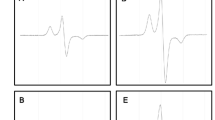Summary
Background: Metallothionein (MT)# synthesis can be stimulated in many organs not only by various metals such as cadmium, zinc, and copper, but also by many nonmetalic compounds or experimental conditions such as oxidative stress. The latter lead to the hypothesis that MT is induced in response to free radicals formed in tissues and lipid peroxidation.
Aims of the study: Whether the relationship between lipid peroxidation amd MT synthesis is a common phenomenon also valid for lipid peroxidation induced by dietary factors such as chronic vitamin E inadequacy and autoxidation products of polyenoic fatty acids derived from thermally oxidized oil was investigated in the presence study.
Methods: The relationship between the induction of metallothionein isoforms I and II (MT-I and MT-II) in response to diet-induced lipid peroxidation using a rat model system in which lipid peroxidation was examined in vivo by chronic vitamin E inadequacy or by administration of lipid peroxidation products from a thermally treated polyenoicrich oil with either basal (dietary zinc concentration: 48 mg/kd; experiment 1) or Zn-stimulated MT levels (dietary zinc concentration: 305 mg/kd; experiment 2) was studied. In both experiments, growing male rats were fed diet containing either a fresh or a thermally treated soybean oil with deficient of sufficient amounts of vitamin E (14 and 11 vs. 648 and 560 mg α-tocopherol equivalents per kg diet) over 40 days according to a bifactorial experimental design. Plasma and liver concentrations of tocopherols and hepatic levels of thiobarbituric acid-reacitve substances (TBARS) were measured by high performance liquid chromatography. MT isoform concentrations in rat liver were isolated and quantified by ion-exchange high performance liquid chromatography and atomic absorption spectrometry.
Results: Irrespective of the zinc supply, rats receiving inadequate amounts of vitamin E with the diet had markedly lower plasma and liver concentrations of α-tocopherol and total tocopherols than vitamin E-sufficient rats. ANOVA also revealed an interaction between the diet factors vitamin E and oil on tocopherols in plasma and liver of rats from both experiments. In experiment 1, where rats received normal amounts of dietary zinc, ingestion of the thermally treated oil impaired the tocopherol status compared to the treatment with the fresh oil, although this effect was only obvious in the vitamin E-deficient groups. In experiment 2, where rats received excessive amounts of zinc, the thermally treated oil did not contribute to a reduction of the tocopherol status in plasma and liver. In both experiments a significant increase in TBARS level, indicative of lipid peroxidation, was observed in the liver at chronic vitamin E inadequacy, but no effect of the oil was observed. Here, we show that the dietary treatment had some effects on the synthesis of liver metallothionein isoforms. In groups, receiving normal amounts of zinc, there was a significant interaction between the dietary treatments on the levels of MT-I and MT-II in liver. Chronic vitamin E inadequacy which was accompanied by diminisched tocopherol levels in liver induced the synthesis of MT-I and MT-II. When vitamin E inadequacy was combined with the ingestion of a thermally treated polyenoic acid-rich oil hepatic levels of MT-I and MT-II remained low. In experiment 2, where rats were fed the high zinc diet, vitamin E inadequacy caused an increase of hepatic MT-I level just as in experiment 1, although this MT stimulating effect was irrespective of the oil. For MT-II there was a 43% increase in the vitamin E-deficient group fed the fresh oil compared to all the other groups, although this effect was not statistically significant. The liver MT isoform response to stress was similar in rats with basal MT levels and Zn-induced liver MT levels. The failing effect of the thermally treated oil on MT levels which were stimulated by vitamin E deficiency in experiment 2 was possibly due to the low oxidation grade of the thermally treated oil.
Conclusion: The present results are strongly indicative of an apparent induction of MT isoform synthesis in response to an impaired antioxidant defence system in the lipid regions of liver cells induced by vitamin E inadequacy. In contrast, thermally treated polyenoic-rich oils with a certain oxidation grade seem to restrain the induction of MT isoform synthesis under the present experimental conditions.
Similar content being viewed by others
Author information
Authors and Affiliations
Additional information
Received: 10 January 2000, Accepted: 27 April 2000
Rights and permissions
About this article
Cite this article
Stangl, G., Nöstelbacher, K., Eder, K. et al. Chronic vitamin E inadequacy and thermally treated oils affect the synthesis of hepatic metallothionein isoforms. Eur J Nutr 39, 112–120 (2000). https://doi.org/10.1007/s003940070027
Issue Date:
DOI: https://doi.org/10.1007/s003940070027




